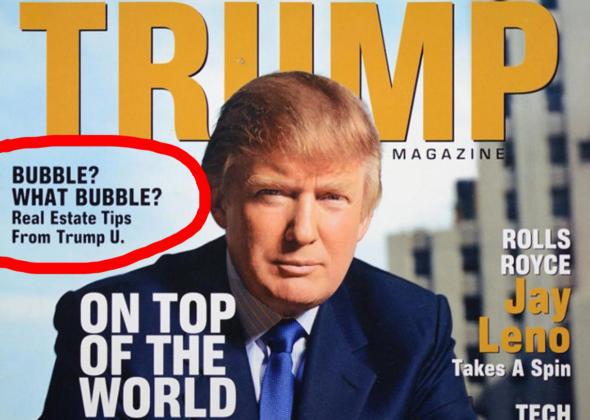
Photo illustration by Slate. Image via Trump Magazine
It seems like there is sleaze under every rock in Trumpworld. The Trump Foundation takes money from donors and spends it on causes that benefit Donald Trump personally. Trump “University” was a high-pressure sales organization selling basically worthless real estate advice. The Trump SoHo tower was built with a partner who’d been convicted of felony assault and racketeering. Trump owned beauty pageants in part so he could ogle women as young as 15 in changing rooms. The co-founder of “Latinos for Trump” is a guy whose real estate license was suspended for improper transactions involving client funds. It goes on and on and on and goddamn on.
In a piece published Tuesday, Fusion turned over a new rock—the short-lived 2000s publication Trump Magazine—and found that it was backed by investors and promoters with histories of involvement in securities fraud. You should read the whole article for a thorough look at how a Trump B.S. sausage gets made, but here’s the outline:
- Trump owned 20 percent of a company called Premiere that was formed in 2005 to produce Trump Magazine. Premiere paid Trump licensing fees of at least $855,000.
- Premiere made an IPO on a penny-stock exchange on Aug. 9, 2006. Penny stocks are not necessarily scams, but are often used in “pump-and-dump” schemes in which a stock’s price is raised artificially via unethical and dishonest sales tactics, allowing initial stockholders to cash in. Then the company and the stock collapses and random suckers are left holding the bag.
- In addition to Trump himself, other entities that held Premiere shares before the IPO included companies including “Legend Merchant Group” and “Lion Advisors” and individuals including one Howard Appel and one Chris Janish. (It’s not clear how Trump became involved with all of these particular people/groups.)
- Premiere stock was sold to members of the public via techniques including cold-calling and the distribution of a newsletter that falsely claimed Premiere was on the verge of signing an agreement with Disney to produce a Trump cartoon. After briefly rising in price, the stock cratered and the company went out of business a year after its IPO. (One humorous note: Premiere did hire a woman named Elizabeth Koshy to make a pilot for the cartoon. She told Fusion she was able to give Trump a low bid because her company outsourced the nuts and bolts of animation to workers in India. And that it took her a year for her to get paid, and that when she did get paid she only got 2/3 of what she was actually owed.)
- Legend Merchant Group was later shut down by regulators that discovered it had engaged in fraudulent activities in cases unrelated to Trump. It also turns out that Lion Advisors was operated out of the Caribbean by a woman who’d been sanctioned by Canadian authorities for “manipulation and fraud” involving a penny-stock exchange, that Howard Appel has a long history of involvement in penny-stock fraud and would serve prison time in 2008, and that Chris Janish was later sentenced to prison for penny-stock fraud. Meanwhile, the CPA Premiere had hired to deal with its regulatory filings later had his license revoked for having engaged in unethical behavior—and was sued by the SEC over his involvement with a penny stock.
Fusion’s piece is careful to note—as is Slate!—that this does not constitute evidence that Premiere/Trump Magazine was itself a fraudulent scheme, or that one Donald J. Trump committed any criminal act. The crimes and violations that the individuals and entities above were convicted of or sanctioned for did not involve Premiere. (There’s also no available evidence at this time that those individuals and entities made profits on Premiere—i.e. that they carried out the “dump” part of the pump-and-dump process). But this is all evidence that Donald Trump was personally involved in a short-lasted penny-stock enterprise with individuals and companies that have histories of penny-stock fraud and other regulatory violations.
It is, in other words, more evidence that Donald Trump is thoroughly enmeshed in a network of scumbags. And incidentally, as you can see above, if you did happen to pick up a copy of Trump Magazine in spring 2006, you would have gotten a “tip” indicating that the crack staff at Trump University did not believe that the U.S. housing market was in a “bubble.” Just months later, the real estate crash that crippled the American economy would begin. It goes on and on.